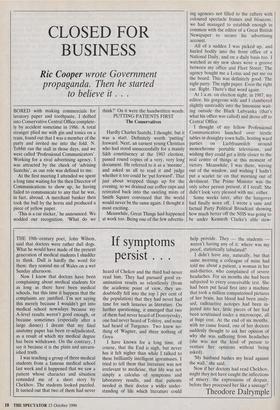If symptoms
persist . . .
THE 19th-century poet, John Wilson, said that doctors were rather dull dogs. What he would have made of the present generation of medical students I shudder to think. Dull is hardly the word for them: they remind me of Wales on a wet Sunday afternoon.
Now I know that doctors have been complaining about medical students for as long as there have been medical schools, but this time it happens that the complaints are justified. I'm not saying this merely because I wouldn't get into medical school nowadays because my A-level results weren't good enough, or because sometimes (especially after a large dinner) I dream that my final anatomy paper has been re-adjudicated, as a result of which my medical degree has been withdrawn. On the contrary, I say it because it is the plain and unvarn- ished truth.
I was teaching a group of three medical students from a famous medical school last week and it happened that we saw a patient whose character and situation reminded me of a short story by Chekhov. The students looked puzzled. It turned out that two of them had never heard of Chekov and the third had never read him. They had pursued good ex- amination results so relentlessly (from the academic point of view, they un- doubtedly fell into the top 1 per cent of the population) that they had never had time for such luxuries as literature. On further questioning, it emerged that two of them had never heard of Dostoyevsky, one had never heard of Tolstoy, and none had heard of Turgenev. Two knew no- thing of Wagner, and three nothing of Goya.
I have known for a long time, of course, that the End is nigh, but never has it felt nigher than while I talked to these brilliantly intelligent igoramuses. I tried to tell them that literature was not irrelevant to medicine, that life was not simply a calculus of symptoms and laboratory results, and that patients needed in their doctor a wider under- standing of life which literature could help provide. They — the students weren't having any of it: where was my proof, statistically tabulated?
I didn't have any, naturally, but that same morning a colleague of mine had told me about a patient, a woman in her mid-thirties, who complained of severe headaches. For six months she had been subjected to every conceivable test. She had been put head first into a machine that took a million computerised pictures of her brain, her blood had been analy- sed, radioactive isotopes had been in- jected into her, little pieces of her had been scrutinised under a microscope, all at huge cost. At the end of six months, with no cause found, one of her doctors suddenly thought to ask her opinion of why she was suffering from headaches (she was not the kind of person to venture her opinions without being asked).
`My husband bashes my head against the wall,' she said.
Now if her doctors had read Chekhov, might they not have caught the inflections of misery, the expressions of despair, before they processed her like a sausage?
Theodore Dalrymple


























































 Previous page
Previous page